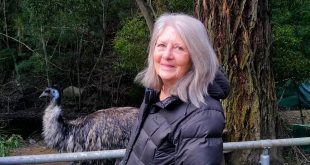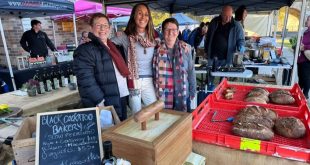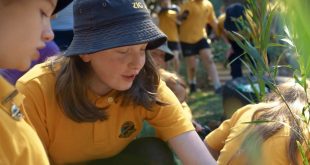
Left to Right: LEG members Chris Jonkers, Thomas Ebersoll, Erica Cavanagh, Julie Favell, Chris Oddie (Photo: Lis Bastian)
Story by Quintin Handley
Key Points:
- Lithgow Environmental Group (LEG) hosted a screening of Tim Flannery’s documentary ‘Climate Changers’ at the Maldhan Ngurr Ngurra Lithgow Transformation Hub. It focused on investigating responsible climate leadership.
- Equally as inspiring as the leadership shown in the documentary was the story of LEG’s twenty-year-long championing of the local environment.
“It’s not a film to be enjoyed, but I hope it will inspire us.”
These were the words with which Thomas Ebersoll of Lithgow Environment Group finished his opening speech before the showing of Tim Flannery’s film: ‘Climate Changers’. The film was shown in the Maldhan Ngurr Ngurra Lithgow Transformation Hub and focused on what role leadership plays in facing the climate crisis. It featured interviews with a variety of leaders, from politicians such as former PM Malcom Turnbull, NSW Treasurer Matt Kean, and 45th American vice-president Al Gore, to Polynesian chieftains and climate activists.
More salient than the examples of leadership displayed in the documentary however, was the living example shown by those presenting the documentary in that small auditorium in Lithgow. The story of Lithgow Environment Group, or LEG as its members call it, is a saga spanning nearly two decades. It is a story of their heroic struggle against fire, local habitat destruction, weak government legislation and in particular, irresponsible mining practices.
LEG was founded in 2005 when concerned members of the public contacted one of the founding members about reports of asbestos in the Lidsdale area. The first meeting was held in 2006 in Lithgow. and identified their primary concern for the local area was the water supply. Soon they had established over thirty water quality monitoring stations throughout the Coxs River, Farmers Creek, and other local watercourses.

Members of LEG checking water quality as part of their ‘Streamwatch’ Program’ (Photo: LEG)
LEG’s most notable achievement came in 2011 when, after two years of litigation, they collaborated with Blue Mountains Conservation Society to stop the pollution of the Coxs River with wastewater from the Wallerawang power station. Read more here
One of the founding members, Julie Favell, stated that “Everywhere I look I see weak legislation. That’s what’s got to change.” Still, they are undaunted in their struggle to preserve their local environment. Erica Cavanagh, another member of LEG, linked this to Tim Flannery’s documentary, saying of Julie “It’s not the collective, it’s individuals who are speaking out, leaders. It takes determination and a certain courage.”
Indeed, the words determination and courage characterise the members of LEG, and the attitude they hold to the endless work required, of just a handful of key members, in monitoring the endless square kilometres of bushland and waterways surrounding Lithgow. “It takes a long time to collect all that data, it’s a lot of fieldwork,” said Julie Favell of the thousands of aggregate hours she and Chris Jonkers have spent trekking the bush and meticulously recording water quality and local biodiversity.
Additional projects of LEG over the years have included monitoring local swamps for potential signs of damage that could occur from mining on the Newnes Plateau, an area now listed as a NSW Endangered Ecological Community. Julie Favell said, “Those swamps have been there for twelve thousand years, and they’re a natural filtering system. If you destroy them it’s not only destroying the local habitat for fauna and flora, but drastically reducing environmental flow, the local water quality, and Sydney’s drinking water. Without water, nothing lives, retainment of water quantity and quality is paramount for all to survive.”
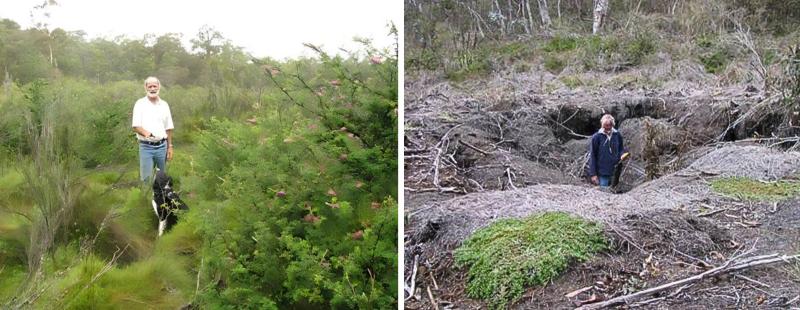
Left: The pristine Farmer’s Creek swamp Right: Chris Jonkers in the East Wolgan Swamp, damaged by mining operations draining the swamp (Photos: LEG)
In wake of the destruction of much animal habitat during the Black Summer Bushfires, LEG has organised a community-driven project to provide artificial nesting hollows, or ‘possum tubes’, for vulnerable species such as the Eastern Pygmy Possum throughout the Ben Bullen State Forest. With materials donated by Lithgow Bunnings, initial design training by Fauna Ecologist Andrew Lothian, the nest boxes constructed by the local Lithgow Women’s Shed, and then installed by concerned local volunteers and LEG members, the project stands as a testament to the ability of a few motivated individuals to organise and rally community effort to step up and do something for the environment.
On May 24th the group organised their 4th Annual Eastern Pygmy Possum and Nature Walk to monitor the progress of the project. Local fauna expert Andrew Lothian led a group in opening up the hollows and cataloguing the inhabitants. Seventeen volunteers inspected 15 nest tubes, and two happy residents were unearthed, a female eastern pygmy possum and a male feathertail glider, both in good health and enjoying the shelter provided by the plastic piping filled with soft doona stuffing.

Left: An Eastern Pygmy Possum blinks in the sun
Middle: The beautiful feather tail of the Feathertail Glider
Right: The Feathertail Glider being carefully held by local expert Andrew Lothian (Photos: Julie Favell)
Though their work may be inspiring, the future of the Lithgow Environment Group is uncertain. After twenty years of dedication its members are worried that in ten or fifteen years there may be no one remaining in Lithgow to carry on walking the trails, documenting, and supporting the local environment. As such the LEG is calling for new members from the Lithgow/Blue Mountains area. Julie Favell says they’re “seeking volunteers to join and learn, we want to educate and pass on our knowledge.” Any interested persons can find the LEG website and email address at the end of this article.
Any who make that step will find themselves welcomed with open arms and warm smiles into a small but committed community of local heroes passionate about their local environment, as I was for a brief but happy time when I stepped into the Lithgow Transformation Hub and tripped over the story of these true ‘climate changers’. Their existence answers in the affirmative to the overarching question in Tim Flannery’s documentary: do we still have those leaders out there with the determination and courage to stand up and rally us against climate change.
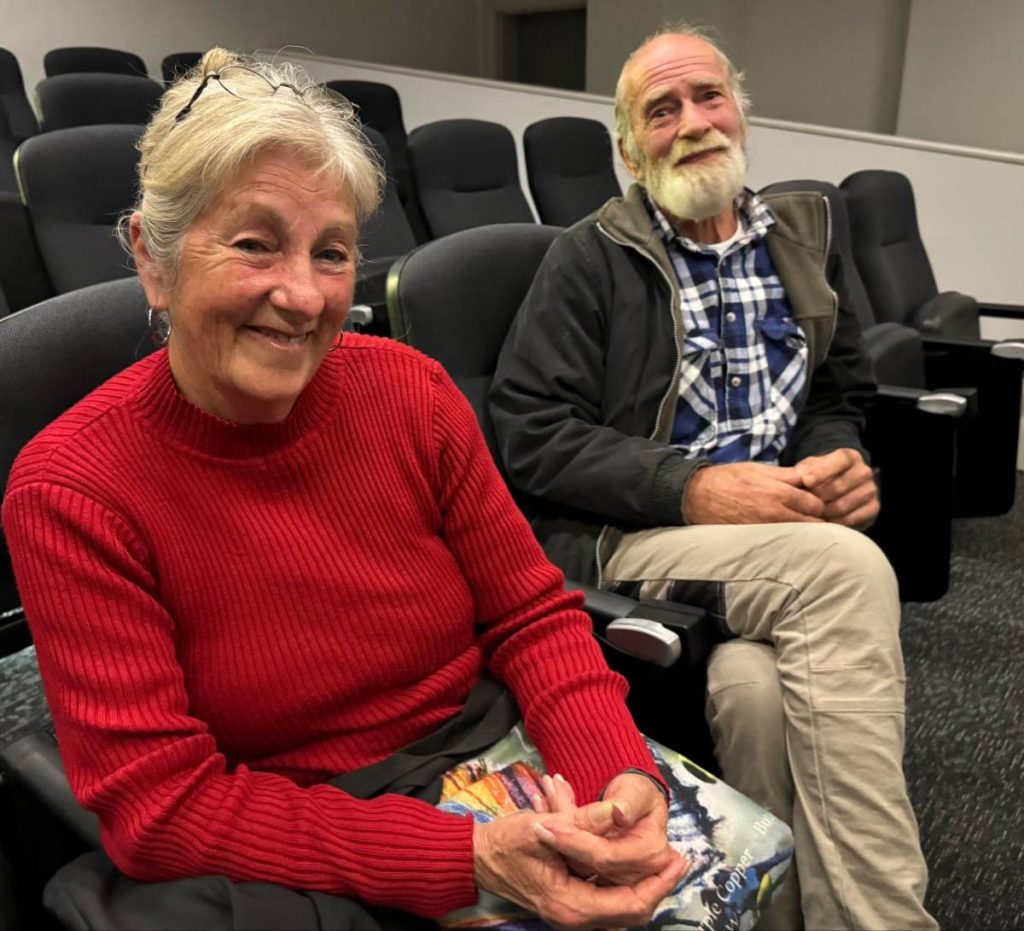
LEG members Julie Favell and Chris Jonkers at the screening of ‘Climate Changers’ (Photo: Lis Bastian)
‘Think locally, act locally, I think we really have made a difference in this little town’ – Chris Jonkers
Take Action:
- Join! “If you have the passion, we welcome anyone, there’s no person we wouldn’t include if their passion was to learn more about the environment. The environment always needs passionate people and you can do it.”
- If Lithgow is too far, start your own group “Don’t feel that you don’t have the knowledge, you’ve got to start somewhere, LEG started with very little knowledge, you’ve got to start somewhere”
- Find out more at their website https://www.lithgowenvironment.au, or contact the LEG through their email address; lithgowenviro@gmail.com.
Share this article:
This story has been produced as part of a Bioregional Collaboration for Planetary Health and is supported by the Disaster Risk Reduction Fund (DRRF). The DRRF is jointly funded by the Australian and New South Wales governments.
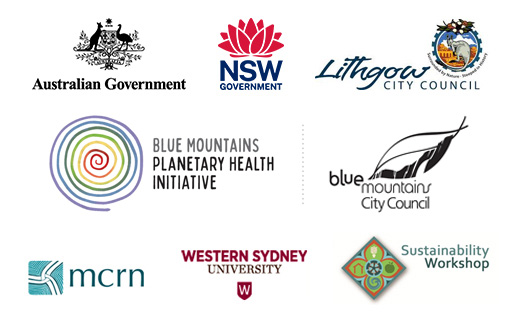
News From Around The Region
As 190 countries gather for the @cop16colombia UN Biodiversity Summit, to focus on how we can protect the world’s flora and fauna, we’d like to thank all those local individuals and organisations dedicated to the same goal who came together for World Animal Day at the Blue Mountains Planetary Health Centre on Saturday 5 October. They offered ways for everyone to learn more and take action. From the Blue Mountains Bird Observers, who led over 40 people on a guided Breakfast with the Birds walk, to many others who offered information stalls, talks, workshops, a Wild Life exhibition, live music, plant-based food and hands-on Bushcare. We also launched the Community Plant Based Cooking Project with the first class to be held on Saturday 9 November at @roseyravelstonbooks in Lawson. Places are limited. Learn more here: https://plantinspired.com.au/
#worldanimalday #biodiversity #plantbased #planetaryhealth #bluemountains #katoomba
Did you know that old lino, window putty, and adhesive can contain asbestos? Yesterday the Asbestos & Hazardous Materials Management Conference kicked off with a pre-conference workshop at the Blue Mountains Planetary Health Centre. It included hands-on `spot the asbestos` and asbestos sampling sessions. This year`s theme is `Working together for a safe and healthy future`. #asbestos #hazardousmaterials #conference #planetaryhealth #bluemountains #katoomba
A huge thank you to Josh Logan from Logan Signs, Lithgow, for installing our Circular Water Signage in time for our World Animal Day Celebration today at the Blue Mountains Planetary Health Centre (33-39 Acacia St Katoomba). We have a full program of events with lots of information on how to prepare for the summer ahead and how to create urban areas that help us share our home respectfully with all species. It will be a fun family day too with storytime, craft and live music for kids! (Link in profile) #worldanimalday #planetaryhealth #familyday #katoomba #bluemountains
And our Wild Life exhibition is now up for World Animal Day tomorrow at the Blue Mountains Planetary Health Centre. Photographs by Warren Hinder, Merryl Watkins, Holly Kent and Tracy Burgess. Check out all the other events from stalls, talks, possum box demo, kid`s craft and animal storytime, plant based food and live music to Bushcare. @33-39 Acacia St Katoomba Link in profile. #planetaryhealth #worldanimalday #katoomba
Join the Blue Mountains Planetary Health Initiative at World Animal Day this Saturday 5 October for a discussion on the history of the Plant Based Food Movement in Australia and a discussion of exciting contemporary trends. It will be followed by a Plant Based Cheese Degustation to launch the Plant Inspired Community Cooking Project. This will be a series of cooking classes to introduce the community to plant based cooking techniques. The event is free but places are limited so bookings essential (link in profile): https://bit.ly/3Bzbwhu
#plantbasedcooking #worldanimalday #bluemountains #katoomba #planetaryhealth #communitycooking
We share the Blue Mountains with so many extraordinary beings but have you seen them and do you know their names? Do you know the difference between a Royal Spoonbill and an Eastern Shrike-tit, or the difference between a bandicoot and an antechinus? Come and check out our Wild Life Exhibition at World Animal Day this Saturday to learn more from the stunning photographs by Warren Hinder, Merryl Watkins, Holly Kent and Tracy Burgess. There will be also be a Breakfast with the Birds at 8.30am, Animal Storytime and Craft for kids from 10am, stalls, talks, food and live music. The day is free but please book via Eventbrite to help us cater (link in profile): https://bit.ly/4eMhbz0 @bluemountainswalks @merrylwatkinsphotography @bestofbluemountains
#royalspoonbill #easternshriketit #wildlife #birdsofthebluemountains #bluemountains #katoomba #worldanimalday #biodiversity #planetaryhealth
To coincide with the first day of Bushfire Season we launched Air Watch at the Planetary Health Centre yesterday. For the last seven years Blue Mountains Unions & Community have been working tirelessly to ensure residents of the Blue Mountains and Lithgow are able to measure and track the quality of the air we breathe. The Blue Mountains Planetary Health Initiative has worked closely with them over the last year and now there are 20 PurpleAir monitors distributed throughout the Blue Mountains and Lithgow, including one at the Planetary Health Centre. You can now view real time air quality measurements at each of our local news sites and on the Purple Air Map https://map.purpleair.com We have 10 more sensors available, so if you’d like to install a sensor, members of BMUC will be at World Animal Day at the Planetary Health Centre this Saturday 5 October to take applications and share more information about the project. Bookings for World Animal Day here (link in profile): https://www.eventbrite.com.au/e/world-animal-day-promoting-respectful-cohabitation-tickets-1029328889417
It was a fabulous day yesterday as each speaker highlighted how critically important this project is: Dr Rosemary Dillon CEO of Blue Mountains City Council Trish Doyle MP Dr Jenna Condie from Blue Mountains Parents for Climate Dr Maggie Davidson, environmental scientist from Western Sydney University Matthew Riley, Director Climate and Atmospheric Science from NSW Department of Climate Change, Energy, the Environment and Water and Peter Lammiman and Ann-Maree McEwan from the BMUC’s Airwatch Committee.
@bluemountainsunionists @nswdcceew @bluemountainscitycouncil @westernsydneyu @trishdoylemp @parentsforclimatebluemountains #airqualilty #airqualitymonitors #bluemountains #planetaryhealth
Treat yourself this weekend with a fun-filled and informative World Animal Day event at the Planetary Health Precinct in Katoomba. As well as a Breakfast with the Birds, stalls and a possum box demonstration, there will be a fabulous wildlife exhibition with photos by Warren Hinder, Merryl Watkins, Tracy Burgess and Holly Jayne; live music with Mem Davis, Joe Flood and Duck Keegan; lots of fun for kids with Sharon Baldwin and Naomi Crew leading animal storytime and craft with Julie Refferty; delicious plant based, gluten and dairy free treats, pastries and donuts from Clean Cravings; a plant based cheese degustation and warming Dahl, rice roasted cauliflower with veggies, pakoras, tamarind chutney, and salad courtesy of Bibi’s Kitchen. Come and learn more about Blue Mountains Bird Observers, Blue Mountains Conservation Society, WIRES, Action for Animals Blue Mountains and Animal Sanctuaries, Wombat Rescue, the Women’s Shed, and Animal Welfare Laws in Australia.
Guest speakers throughout the day will include Elizabeth Ellis, lecturer and author of Australian Animal Law; Hal Ginges, a local lawyer and animal activist from Action for Animals who advocates for animal rights and raises money for sanctuaries; Mark Berriman who has been President of the Australian Vegetarian Society NSW since 1989, as well as Co-ordinator for Animal Liberation NSW, Director of the Natural Health Society of Australia and the World League for Protection of Animals; and Teya Brooks Pribac, a researcher in the area of animal studies and the award-winning author of Enter the Animal. She’s also published Not Just Another Vegan Cookbook and will be sharing her culinary skills with the community in the Plant Inspired Community Cooking Project.
The event is free but please book your place to help us cater (link in profile): https://www.eventbrite.com.au/e/world-animal-day-promoting-respectful-cohabitation-tickets-1029328889417
#worldanimalday #plantbased #planetaryhealth #katoomba #bluemountains
We are so looking forward to kicking off World Animal Day Celebrations on Saturday 5 October with an 8.30am Breakfast with the Birds. Join Paul Nagle from the Blue Mountains Bird Observers on a guided bird walk around the Planetary Health Precinct visiting different habitats on the site to observe and talk about the birdlife that is resident and that visits the site. Binoculars are highly recommended.
World Animal Day will be an inspiring family day celebrating the extraordinary diversity of animals we share our world with! The theme is `Promoting Respectful Cohabitation`. Bookings for the Breakfast with the Birds (link in profile)
or here:
https://www.eventbrite.com.au/e/breakfast-with-the-birds-tickets-1028664983657
#birdlife #breakfastwiththebirds #katoomba #worldanimalday #bluemountains #planetaryhealth #respectfulcohabitation
We all need clean air to breathe, but how can we tell how clean our air is?
Thankfully the Air Watch subcommittee of Blue Mountains Unions & Community has worked for years to find ways to help us measure the quality of the air we breathe. Over the past year the Blue Mountains Planetary Health Initiative has worked with them to install Purple Air Quality monitors across our bioregion from Lithgow to the Lower Mountains. You can now view real time air quality on each of our Local News Sites!
Air Watch`s Purple Air quality monitors give the Blue Mountains` 78,000 residents, workers and 3 to 5 million/year visitors the power to make timely, informed decisions about their activities and health. It will also be a reliable source of data for the scientific community.
To coincide with the start of the Bushfire Season on Tuesday 1 October, we`re inviting the whole community to join us to launch Air Watch Blue Mountains and Lithgow at the Planetary Health Precinct. If you`d like to join us book a place here https://bit.ly/4dp2qko (link in profile)
#airquality #purpleair #bluemountainsunionscouncil #planetaryhealth #bluemountains #katoomba #bushfireseason


